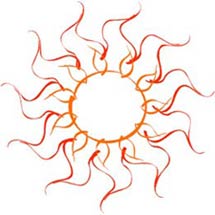When he had finished telling his story, they turned and saw the big man coming towards them; but as close as he was to them, it took him a long time to reach them, because of how bad his walk was and how far he had traveled. And when he finally reached Finn, he saluted him, bowed his head and got down on one knee, making signs of humility.
Finn raised his hand over his head then, and asked about him, and if he was of noble or mean blood of the great world.
The Man answered that he did not know where he came from, only that he was a man of the Fomor, travelling in search of work to the kings of the earth "And I heard," he said, "that Finn never refuses work to any man."
"I never have indeed," said Finn, "and I will not refuse you. But why is it you are without a boy to mind your horse?"
"Because it takes a hundred men's share of food," the big man said "to feed me for one day, and I would begrudge a boy sharing it with me."
"What is your name?" asked Finn.
"Gilla Decair(the Hard Servant)," the man answered.
"Why where you given this name?"
"Because there is nothing in the world harder for me than to do anything at all for my master, or whatever person I am with. And tell me this, Conan, son of Morna," Gilla Decair said, "who gets the best wages, a horseman or a man afoot?"
"A horseman gets twice as much as a man afoot," Answered Conan.
"Then I call you to witness," Gilla Decair said, "that I am a horseman, and that it was as a horseman I came to the Fianna. And give me your guarantee now, Finn, son of Cumhal, and the guarantee of the Fianna, and I will turn out my horse with yours."
"Let him loose then," said Finn.
Gilla Decair pulled off the iron halter from his horse and it took off, running as fast as it could until it reached the horses of the Fianna, where it then began to tear, kick and bite them, killing and maiming many.
"Stop your horse, big man," said Conan, "and by the earth and the sky if it wasn't for Finn's guarantee, I would let out his brains throught the windows I would put into his head."
"And I swear by the earth and the sky," Gilla Decair declaired, "to never bring him out. For it is not work for me to do and I have no serving-boy to do it for me."
Conan, son of Morna, took the halter, put it on the horse, and led it back to where Finn was.
"You would never have done a horse-boy's service, Conan," said Finn, "to anyone of the Fianna, however far he might be beyond this Fomor. And if you will do as I advise," he continued, "you will get up on the horse and ride out throught all the hills, hallows, and flowery plains of Ireland, until his heart is broken as payment for the way he destroyed the horses of the Fianna."
To Be Continuted...











